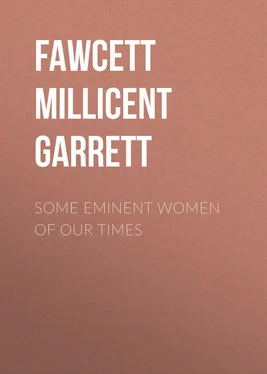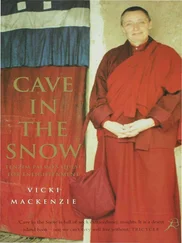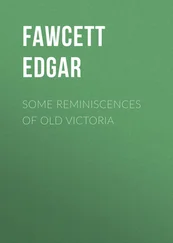Millicent Fawcett - Some Eminent Women of Our Times
Здесь есть возможность читать онлайн «Millicent Fawcett - Some Eminent Women of Our Times» — ознакомительный отрывок электронной книги совершенно бесплатно, а после прочтения отрывка купить полную версию. В некоторых случаях можно слушать аудио, скачать через торрент в формате fb2 и присутствует краткое содержание. Жанр: foreign_antique, foreign_prose, на английском языке. Описание произведения, (предисловие) а так же отзывы посетителей доступны на портале библиотеки ЛибКат.
- Название:Some Eminent Women of Our Times
- Автор:
- Жанр:
- Год:неизвестен
- ISBN:нет данных
- Рейтинг книги:3 / 5. Голосов: 1
-
Избранное:Добавить в избранное
- Отзывы:
-
Ваша оценка:
- 60
- 1
- 2
- 3
- 4
- 5
Some Eminent Women of Our Times: краткое содержание, описание и аннотация
Предлагаем к чтению аннотацию, описание, краткое содержание или предисловие (зависит от того, что написал сам автор книги «Some Eminent Women of Our Times»). Если вы не нашли необходимую информацию о книге — напишите в комментариях, мы постараемся отыскать её.
Some Eminent Women of Our Times — читать онлайн ознакомительный отрывок
Ниже представлен текст книги, разбитый по страницам. Система сохранения места последней прочитанной страницы, позволяет с удобством читать онлайн бесплатно книгу «Some Eminent Women of Our Times», без необходимости каждый раз заново искать на чём Вы остановились. Поставьте закладку, и сможете в любой момент перейти на страницу, на которой закончили чтение.
Интервал:
Закладка:
Dame Millicent Garrett Fawcett
Some Eminent Women of Our Times / Short Biographical Sketches
“Non aver tema, disse il mio Signore:
Fatti sicur, chè noi siamo a buon punto:
Non stringer, ma rallarga ogni vigore.”
“‘I have a belief of my own, and it comforts me.’
“‘What is that?’ said Will…
“‘That by desiring what is perfectly good, even when we don’t quite know what it is and cannot do what we would, we are part of the divine power against evil – widening the skirts of light and making the struggle with darkness narrower.’”
– Middlemarch , Book iv.The following short sketches of the lives of some of the eminent women of our times were written for The Mothers’ Companion , and are now republished by the kind permission of the proprietors and publishers, Messrs. Partridge.
They were suggested by the fact that nearly all the best contributions of women to literature have been made during the last hundred years, and simultaneously with this remarkable development of literary activity among women, there has been an equally remarkable activity in spheres of work held to be peculiarly feminine. So far, therefore, from greater freedom and better education encouraging women to neglect womanly work, it has caused them to apply themselves to it more systematically and more successfully. The names of Elizabeth Fry, Mary Carpenter, Sarah Martin, Agnes Jones, Florence Nightingale, and Sister Dora are a proof of this. I believe that we owe their achievements to the same impulse which in another kind of excellence has given us Jane Austen, Charlotte Brontë, and Elizabeth Browning.
The sketches were intended chiefly for working women and young people; it was hoped it would be an encouragement to them to be reminded how much good work had been done in various ways by women.
An apology should, perhaps, be offered to the reader for the want of arrangement in the sequence of these sketches. As they appeared month by month, in 1887 and 1888, the incidents of the day sometimes suggested the subject. Thus the papers on Queen Victoria and on Queen Louisa of Prussia were suggested by the celebration of the Jubilee in June 1887, and by the universal grief felt for the death of Queen Louisa’s son and grandson in 1888. As the incidents mentioned in some sketches are sometimes referred to in those that follow, it has been thought best not to alter the sequence in which they originally appeared. The authorities relied on are quoted in each paper.
MILLICENT GARRETT FAWCETT. London, 1889.I
ELIZABETH FRY
“Humanity is erroneously considered among the commonplace virtues. If it deserved such a place there would be less urgent need than, alas! there is for its daily exercise among us. In its pale shape of kindly sentiment and bland pity it is common enough, and is always the portion of the cultivated. But humanity armed, aggressive, and alert, never slumbering and never wearying, moving like an ancient hero over the land to slay monsters, is the rarest of virtues.” – John Morley.
The present century is one that is distinguished by the active part women have taken in careers that were previously closed to them. Some people would have us believe that if women write books, paint pictures, and understand science and ancient languages, they will cease to be true women, and cease to care for those womanly occupations and responsibilities that have always been entrusted to them. This is an essentially false and mistaken notion. True cultivation of the understanding makes a sensible woman value at their real high worth all her womanly duties, and so far from making her neglect them, causes her to appreciate them more highly than she would otherwise have done. It has always been held – at least, in Christian countries – that the most womanly of women’s duties are to be found in works of mercy to those who are desolate and miserable. To be thirsty, hungry, naked, sick, or in prison, is to have a claim for compassion and comfort upon womanly pity and tenderness. And we shall see, if we look back over recent years, that never have these womanly tasks been more zealously fulfilled than they have been in the century which has produced Elizabeth Fry, Florence Nightingale, Josephine Butler, and Octavia Hill.
Mrs. Fry was born before the beginning of this century – in 1780 – but the great public work with which her memory will always be connected was not begun till about 1813. She was born of the wealthy Quaker family, the Gurneys of Norwich. Her parents were not very strict members of the sect to which they belonged, for they allowed their children to learn music and dancing – pursuits that were then considered very worldly even by many who did not belong to the Society of Friends. The gentle poet, William Cowper, speaks in one of his letters, written about the time of Elizabeth Fry’s childhood, of love of music as a thing which tends “to weaken and destroy the spiritual discernment.” Mr. and Mrs. Gurney, however, seem to have been very free from such prejudices, as well as from others which were much more universal, for their children not only learnt music and dancing, but also – girls as well as boys – Latin and mathematics.
Mrs. Gurney seems to have discerned that she had an especial treasure in her little Elizabeth. She is spoken of in her mother’s journal as “my dove-like Betsy.” The authoress of the biography of Elizabeth Fry in the Eminent Women series, says: “Her faculty for independent investigation, her unswerving loyalty to duty, and her fearless perseverance in works of benevolence, were all foreshadowed” in her childhood. She had as a young girl what appears to us now a very extraordinary dread of enthusiasm in religion. One would think that if ever a woman needed enthusiasm for her life’s work, Elizabeth Fry was that woman. But she confesses in her journal, written when she was seventeen years of age, “the greatest fear of religion” because it is generally allied with enthusiasm. Perhaps the truth is that she had so deep a natural fount of enthusiasm in her heart that she dreaded the work that it would impel her to, when once it was allowed a free course. She had a very strong, innate repugnance to anything which drew public attention upon herself, and only the imperative sense of duty enabled her to overcome this feeling. In her heart she said what her Master had said before her: “Father, if it be possible, let this cup pass from me.”
When the sphere of public duty first revealed itself to her, she records in her diary what it cost her to enter upon it, and writes of it as “the humiliating path that has appeared to be opening before me.” It must be noticed, however, that in her case, as always, the steep and difficult path of duty becomes easier to those who do not flinch from it. In a later passage of her diary, the public work which she had at first called a path of humiliation she speaks of as “this great mercy.”
In the little book to which reference has just been made, we read that the first great change in Elizabeth Gurney’s life was caused by the deep impression made upon her by the sermons of William Savery. It is rather strange to find the girl who had such a terror of enthusiasm, weeping passionately while William Savery was preaching. Her sister has described what took place. “Betsy astonished us all by the great feeling she showed. She wept most of the way home… What she went through in her own mind I cannot say; but the results were most powerful and most evident” (p. 11, Elizabeth Fry . By Mrs. E. R. Pitman). Her emotion was not of the kind that passes away and leaves no trace behind. The whole course of her life and tenor of her thoughts were changed.
Читать дальшеИнтервал:
Закладка:
Похожие книги на «Some Eminent Women of Our Times»
Представляем Вашему вниманию похожие книги на «Some Eminent Women of Our Times» списком для выбора. Мы отобрали схожую по названию и смыслу литературу в надежде предоставить читателям больше вариантов отыскать новые, интересные, ещё непрочитанные произведения.
Обсуждение, отзывы о книге «Some Eminent Women of Our Times» и просто собственные мнения читателей. Оставьте ваши комментарии, напишите, что Вы думаете о произведении, его смысле или главных героях. Укажите что конкретно понравилось, а что нет, и почему Вы так считаете.




![Корнелл Вулрич - Murder at Mother’s Knee [= Something That Happened in Our House]](/books/398097/kornell-vulrich-murder-at-mother-s-knee-somethin-thumb.webp)







